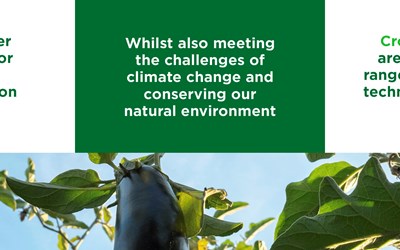We must deliver food security for an increasing global population, whilst at the same time meeting the challenges of climate change and conserving our natural environment.

By 2050, the global population could be 10 billion people. The land available to feed them is not increasing; and global food security has been shown to be more fragile than many thought. We must cope with a warming planet and conserve global biodiversity. To meet these challenges, we need technologies and new innovations.
Food vulnerability
Covid-19 and the Ukraine war have stretched global supply chains and, with climate change, the issue of food security has risen up the agenda. Increased prosperity in the developing world and a global middle class set to hit 5 billion in the coming decade will lead to a much higher demand for meat. We need a global solution embracing innovation and technological advances.
A new revolution
The 1960s’ Green Revolution saw more people fed well than ever before. However, this came at a cost; farming enough land to feed billions affected natural environments. Today we have an opportunity; to confront the challenges of global food insecurity, but also to look after the natural environment and contribute to carbon net zero. Advances in genetics, chemical & biological plant protection, and other emerging technologies mean that we can do more with less. This new revolution should use the most productive agricultural land to ensure food security, with other land prioritised for nature and other uses. By embracing new technology, we can consolidate the productivity gains of the Green Revolution, ensuring food security, whilst also prioritising biodiversity and tackling climate change.
Policy threats, and opportunities
In many developed countries, policymakers have failed to wake up to the reality that food security is threatened. Productivity has been secondary to other factors in agricultural policy. This is unsustainable. Governments must welcome the opportunities that innovative techniques and technologies present. We must embrace productive agriculture at home.
A path forward
Agriculture has changed in recent decades and farming will be unrecognisable in less than a generation. CropLife members are creating a wide range of new tools and techniques for growers; we need to work with governments to make these available to farmers. By championing innovation, fit for purpose regulation, and supporting sustainable practices, we can ensure a healthy agricultural landscape for future generations. Let’s lead the way to a more sustainable future.




